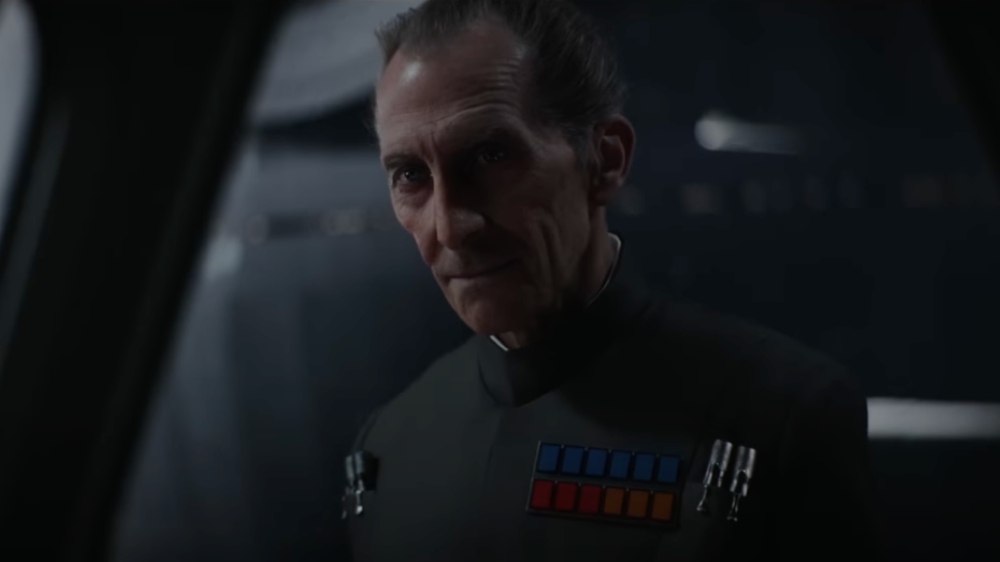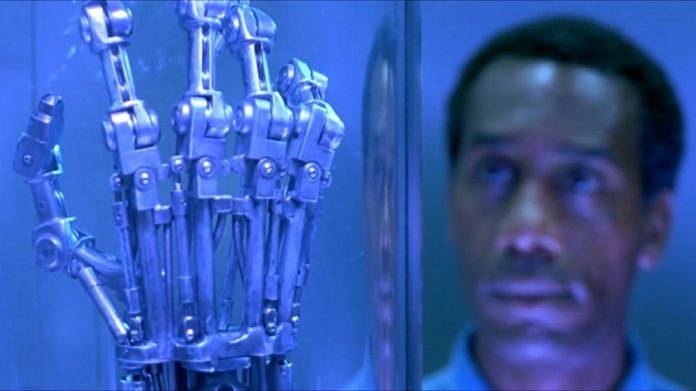A couple of weeks ago, SAG-AFTRA president Fran Drescher made a comment about her union’s upcoming negotiations with the AMPTP and how what the writers want is not “the kind of stuff that [SAG is] going after.” Predictably, her words caused an uproar online because of how shortsighted they were. Though Drescher walked it back rather quickly, saying the unions have to stand with each other, the damage was already done, as her statement showed a crack in the union wall that is going to have to be maintained if anyone on the creative side of this “war” is going to come out alive.
Why Drescher ever thought this at all is pretty baffling to me because, from the very beginning, it has been inordinately clear that the biggest threat to the film industry is artificial intelligence, which is just as dangerous to performers as it is to writers, if not more so.
Director Joe Russo made mention of this last month at a film festival, and now Justine Bateman has written a Newsweek op-ed about it, though their takes on AI were decidedly different, with Russo proclaiming its usefulness in the creation of content, and Bateman decrying it. I’ve already addressed Russo’s misguided attitude about this whole thing, so no need to revisit that (unless you missed it the first time), but while I was in L.A. last week, I had a lot of conversations about the Writers Strike, and the dangers of AI came up quite a bit.
This strike is ultimately about three things — the WGA wants the members of the AMPTP to pay writers a living wage, including higher residuals based on a title’s popularity; which means that streamers must be as transparent with their viewing stats as studios have to be with box office numbers; and forsake any usage of artificial intelligence for anything other than fact-checking and support, i.e. no literary material “created by” AI whatsoever.
SAG-AFTRA president Fran Drescher on a possible actors strike: “It’s a very big, complicated conversation,” she tells Deadline outside Paramount Pictures in LA today #WritersStrike pic.twitter.com/lK3QXnY69b
— Deadline Hollywood (@DEADLINE) May 9, 2023
The first item should be a no-brainer, as someone working on a TV show should not have to hold down a second job as an Uber driver or use the local library’s wifi to send in scripts because they can’t afford high-speed internet at home. The second is easier than you think when one considers that the six highest-paid executives at Netflix earned $167 million last year, and the amount the writers would be looking for from that streaming service would amount to an extra $68 million per year.
I ultimately think both of those items will get worked out to some degree, but it’s the AI thing that really scares me, because of how lucrative its usage will be for the members of the AMPTP, even at the expense of the quality of the entertainment they’ll end up producing as a result.
Aside from the fact that artificial intelligence might one day be able to create “entertainment” tailored to an individual — in Russo’s example, it would be his own avatar paired with Marilyn Monroe in a romantic comedy, which is creepy on multiple levels — it would mean using artificially duplicated actors. Perhaps the studio has licensed a star’s likeness or, if they’ve passed on, permission from their estate (Peter Cushing‘s was thanked in the credits of Rogue One), or perhaps they’ve been gone so long that their likeness is now available in the public domain (70 years after death in the state of California). Either way, they’re not real people who are performing or creating the story.
Why is this a big deal? Aside from contributing to our own demise by making humanity irrelevant and, therefore, obsolete — and more about that in a moment — it diminishes the very art that we, as humans, create. It also destroys an industry that was built on the strength of human creativity and innovation, thereby boiling such gifts down to the lowest of common denominators.

About a month ago, I was clued in regarding something that had been posted on Reddit. Someone had asked ChatGPT to create a movie synopsis for a Terminator origin story explaining how Skynet came to be, and who the T-800 was modeled after, so that’s exactly what the system did. The response was fairly enthusiastic, with some readers impressed enough that they wanted to show the finished product to James Cameron because, to quote one of them, “it’s better than any script after T2,” but, of course, that misses the point.
If we’re being perfectly fair, the story itself isn’t bad. It’’ actually got some interesting touches to it. What it misses, however, is nuance and detail, not to mention dialogue. It’s nothing more than broad strokes sketched out over a few paragraphs — hardly a real story. Even something as infantile as Fast X, which I saw last week — at least partially to help illustrate this argument — has nuance and detail, even if much of it is ham-fisted. Could AI come up with the plot of a Fast & Furious movie? Possibly, but it’s not going to get the right characterization, such as it is, nor will it be as inventive in the action set pieces which — again, being fair — are a work of art in and of themselves.
But if companies were to rely on AI to tell stories, that’s all we would get — broad strokes and simple narratives without any depth. And if someone like Drescher doesn’t think that AI is coming for actors’ jobs, too, then I have some farmland to sell her in Zimbabwe. I may not believe that Vin Diesel is the second coming of Sir Laurence Olivier, but I certainly believe that, as a human being, he is going to bring more to the role of Dom Torretto than an artificial construct built inside a computer.
There is a reason, after all, that even in video games, real actors are used to portray the characters on screen, rather than just having them be created whole cloth from pixels. The human factor allows us to emote — to show and feel empathy and do things that computers can’t. But since using those AI systems will cost less than hiring real people, those doing the hiring continue to refuse to rule them out.
As if it isn’t abundantly clear by now, this is all pretty existential stuff. Since I mentioned the Terminator franchise above, it’s worth pointing out that fictional depictions of humans creating and using artificial intelligence literally never work out well for us. James Cameron, for one, built his career on it, as did the Wachowski siblings and plenty of others. There is even a new movie about this very subject coming out this September — a big-budget actioner titled The Creator that stars John David Washington and features AI as the movie’s central villain. One of the human characters even says in the trailer that if Washington’s character doesn’t execute the AI in question, “we go extinct.”
If you’re not clear on the “we” in this context, it’s humanity.
It is hardly hyperbole to say that writers and actors face a similar fate unless something is done to stop it (directors, too, obviously, though it’s not yet clear that the DGA’s leadership gets this yet, which is fodder for another column). And if you think this doesn’t directly affect you, you have to consider how much televised or cinematic entertainment you consume, and how much you care about its quality. Because if the answer to either point is even “a little,” then it affects you quite a lot.
If this line is crossed, it’s not something from which we or the entertainment industry will ever be able to come back. More and more people are beginning to understand this, but that understanding has to be universal or else we’re all going to suffer.
We see it over and over again in our content: humans create AI, then watch it become the instrument of our own destruction. This is no different, except it’s not in a movie or TV show created by a human. The once-existential threat is now very, very real.
 Neil Turitz is a journalist, essayist, author, and filmmaker who has worked in and written about Hollywood for more than 25 years, though he has never lived there. These days, he splits his time between New York City and the Berkshires. He’s not on Twitter, but you can find him on Instagram @6wordreviews.
Neil Turitz is a journalist, essayist, author, and filmmaker who has worked in and written about Hollywood for more than 25 years, though he has never lived there. These days, he splits his time between New York City and the Berkshires. He’s not on Twitter, but you can find him on Instagram @6wordreviews.
You can read a new installation of The Accidental Turitz every Wednesday, and all previous columns can be found here.



